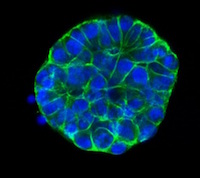Channels
Special Offers & Promotions
Novel Reagents for Organoid Growth and Harvesting
AMSBIO has introduced two new products to assist the increasing number of scientists adopting organoid culture as a physiologically relevant model for organ development.
 These new tools build upon the widespread use of AMSBIO’s BME2 ‘organoid matrix’ by leading research groups worldwide. BME 2 is the extracellular matrix of choice for growing and supporting organoid cultures that are increasingly being adopted in drug screening applications.
These new tools build upon the widespread use of AMSBIO’s BME2 ‘organoid matrix’ by leading research groups worldwide. BME 2 is the extracellular matrix of choice for growing and supporting organoid cultures that are increasingly being adopted in drug screening applications.
A new R-Spondin1 cell line has been developed that provides a cost-effective solution by which labs can obtain a long-term supply of R-Spondin1 (RSPO1), which is a critical ingredient used in the maintenance and proliferation of mouse and human organoid progenitor stem cells. R-Spondins positively regulate Wnt/beta-catenin signaling, most probably by acting as a ligand for LGR4-6 receptors and an inhibitor for ZNRF3. Our 293T cell line is stably transfected to express murine RSPO1 with an N-terminal HA epitope tag and fused to a C-terminal murine IgG2a Fc fragment As a consequence this cell line can be used to produce either purified RSPO1 or RSPO1 conditioned media. The murine RSPO1 protein from this cell line has been demonstrated to lower the cost of organoid culture and to maintain Lgr5+ stem cells.
AMSBIO has also introduced a new organoid harvesting solution that addresses the challenge of separating intact organoids from extracellular proteins in the hydrogel for passaging, cryopreservation, or biochemical analysis; and to facilitate PDX xenograft models
Typically organoid cultures exhibit cellular behaviors and morphologies similar to those seen in vivo. Unfortunately, adapting these models to study biochemical processes has been impeded by problems associated with separating intact organoids from the extracellular proteins that comprise the hydrogel. Commonly, proteases have been employed to degrade these extracellular proteins, but protease techniques have the disadvantages that they also degrade proteins on the cell surface, and that protease activity may carry over into subsequent cultures or lysate preparations. The Cultrex® Organoid Harvesting Solution from AMSBIO provides a new non-enzymatic method for depolymerizing extracellular matrix proteins, enabling harvesting of intact organoids for downstream applications.
Media Partners


